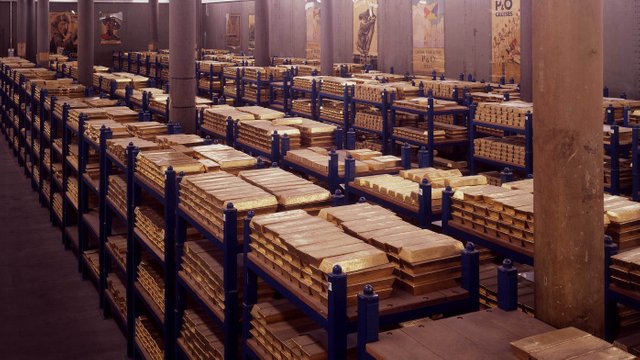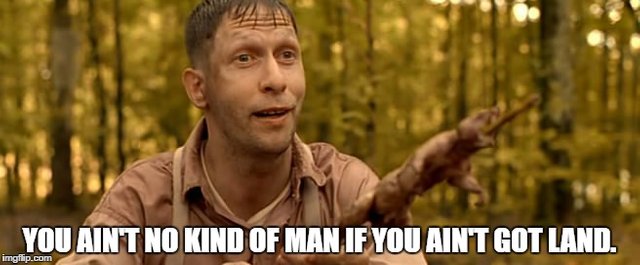A Simplified Taxless State: A Proposal (part two of three)
In this three-part series, I'm going to show how a state can be a pure market actor and not require taxation. The state will still have an income - cynics would call it taxes under any other name - but the key difference is that the income is obtained through market means, based on a state's USP, and not through coercion by force. This leads to a society where the state does not need to know anybody's income, wealth, or transactions, leading to the obsolescence of most registers and reporting requirements (including the elimination of a corporate register), and where a "black market" is a contradiction in terms, as the state does not interfere with the market it is a natural part of. It also means an end to victimless crimes by its very nature.

Part Two: A low-friction voluntary economy
In the first part of this series, I introduced necessary new way of thinking of land ownership - how there are tier-one and tier-two land owners, and a nation-state is the only type of entity capable of owning land, on the basis that it's the only type of entity able to maintain a military capable of repelling other tier-one land owners (other countries).
This leads us to part two, where I elaborate on the gains this brings, given that one accepts the premise that the state owns all land (even if it pretends to give sub-ownership, that's still sub-ownership, as argued in part one). This means that people who formally lease a land plot pay a lease for that plot to the state. Everything is voluntary and on market terms, and this gives the state an income with which to uphold basic internal and external security, civil services, and a social safety net (probably universal basic income) to its liking - but just as probably not enough money to employ scores of unnecessary bureaucrats and gender study batallions.
(Let's skip for now exactly what a land lease will look like - I'll be returning to some basic thoughts around that and possible models in part three.)
Wealth is created in the quantity of voluntary trades
Remember how, if we want to create wealth in a nation, our objective is to maximize the quantity of voluntary trades? This means we should enable people to trade how they want, when they want, what they want, and without any burden of taxing, recording, or reporting any of it.
This structure, where the state gets all its income from voluntary land lease and nowhere else, enables a society to have exactly that.
There is no longer any need for bookkeeping regulation. There is no longer any need for banking regulation. There is no car register. Apart from leasing land, there are no forms whatsoever.

The state gets its income at the bottom of the stack, literally on ground level of the economy. Every other cost must be enough to cover that land lease. The rest of the economy can work exactly how it wants, and will work exactly how it wants.
There are no income taxes, which leads to people being able to make income how and when they please, from one or many sources. There is therefore no personal tax declaration and no tax return forms. There is no corporate registry and therefore no corporate taxes either -- investment and bankruptcy protection can be well handled contractually -- and therefore no bookkeeping requirements. There are no authority forms whatsoever for regular everyday business over and above the state income, which is land lease and only land lease.
(Obviously, corporations could keep proper bookkeeping anyway. If they want to. In any form they want. That's the whole point! Maybe there are better forms of bookkeeping today than the double Venetian bookkeeping from 1495. Yes, you read that right: fourteen ninety-five.)
Imagine the amount of trade that can happen if you just allow it to happen, if you don't burden it down with recording and reporting requirements for every single transaction - if you don't have to care about any one single transaction and can have the state work just fine anyway!
This also means that there's no tax wedge at all into the efficiency gains from division of labor. If there's a few percent of efficiency to gain from exchanging services, there's no longer a state which makes that unprofitable before there's a 150% gain - or more usually a 500% gain. Imagine the efficiency gains unlocked!
As a corollary, imagine the wealth that can be built if you remove all - all - obstacles to trade like this! It has the potential to be running circles around a traditional society with an overdeveloped sense of bureaucratic order.
In part three, we'll return more precisely to a few models of how the land lease could work in terms of market pricing and trade. There's also the important question on how to value land improvements.

Victimless crimes cease to exist
As a final note on this part, it is absolutely key that the Simplified Taxless State remains a non-privileged market actor, even if it is also the arbiter between market actors in another role. By this, I mean that the state is strictly prohibited from inventing "collective problems" and give itself the right to use force against citizens to "solve" those problems. This has the very important side effect that the state can't enforce arbitrary behavioral rules against citizens where there's no victim, and therefore, no claim.
In other words, in just that definition of the state duty, we have introduced a requirement onto the definition of a crime: There must be a victim pressing charges. This basically means that everything except crimes against life, liberty, and property cease to be criminalized immediately - just as it should be. There is no reason for a state to interfere with somebody exercising their property rights to manufacture slippers, a chair, or a DVD from their own materials. There is no reason for a state to interfere with voluntary trade of goods and services, except moralistic reasons, which should go out the window yesterday anyway.
Oh, and what about pollution, which is the most common objection to this? How would this scheme handle pollution? That's actually one of the easiest things in this entire picture. Remember how, when you lease a residence, you're liable for any damages caused to the residence by you during your lease? The exact same standard boilerplate could just as well apply to a land lease, and it's as simple as that.
In part three, we'll look more at the land leases that make up the state's voluntary income.
I posted a question on the first part, but I don't see a particular answer to it (or perhaps I've misunderstood the answer): given the voluntary nature of employing governmental services, i.e. the state actor has no coercively-enforced advantage in the marketplace, could an individual simply declare their plot of land independent from state control and become a de-facto tier-one land owner, so long as he or she also does not request the benefits that the state actor is able to provide?
If it's an economically better alternative, it should be possible. The powerful enterprise in this case would constitute a new "state", with it's own defense which is more cost-efficient.
This company will not have any kind of commitment to the environment. This could create a pollution problem.
Yea it all boils down to the cost efficiency of their protection. So then we would have hubs of rebellion against the state, of people claiming this bubble of land as their own, and because they can defend it there is nothing anyone can do. This sounds alot like the oligarchies of old, or exactly like the system we already have.
Wow, thats a really good question. In practice it will be a question of power. Imagine, this "individual" is not an anarchist guy, but a big corporation worth billions of Dollars. Than it might have the power to become a state by his own. If not, how about a bunch of these big corporations together?
there is a reason this question is going unanswered.
I think the idea of voluntary states/taxation will be necessary to bridge the gap between a world of nation states and free anarchy. From the early days of rape and pillage to the charming dispositions of swindlers, taxation has evolved to the point most people doubt it is compulsory.
Now, I don't particularly like the idea of a tax on all land being called voluntary. Unless you're a fish or a seasteading billionaire, it'd be identical to the present day minus all the other compulsory taxes. Besides,
The underlying premise, that the state rightfully owns the earth, would just be a reset button on state power. This belief in states is entirely cultural. It is William Blake's "mind-forged manacles" and if people don't stop believing this bullshit no amount of political reform is going to be enough. The problem with a free market society coexisting with a government is the government will grow incredibly powerful by feeding off its productive people. The U.S. is perhaps the most historically relevant example of this. Additionally, land and future taxation can be used as collateral for credit. It's a recipe for unconstrained growth.
I think another means of facilitating this transition is too simply relax government control and allow businesses to step into traditional government roles. E.g FedEx or UPS. If the service is necessary and needed, people will pay for it willingly. As I see it, nothing major needs to be undone or tore down. Time and consumer choice would make the government service obsolete. Let them fade away.
Another factor we mustn't overlook when we ponder a free society is the very interface we are conversing through. The internet completely changes what future self-government will look like. We can see glimmers of it nowadays, but who knows what a couple of centuries of this will do to our political systems.
Love how your taking a very advanced concept and presenting it in a very plain language way. I thank you a lot, love the concept.
wow this guy totally nails it eh !
our objective is to maximize the quantity of voluntary trades? This means we should enable people to trade how they want, when they want, what they want, and without any burden of taxing, recording, or reporting any of it.......
is it not the very essence of this community of Steem, decentralized exchange of real wealth from one to another without need of explanation to anyone ! with nothing more than a rent of space from a citizen owned and paid for protection system protecting the tenants if you like of this physical space and it,s right to exist ! Based on the historical boundaries of man which would be for the greater part seen as being still relevant by the greater majority of people living within its borders !! The problem will always be the borders, but they can too be liquefied by an online decentralized community of nations combined in a true exchange of wealth be it gold or Steem . Where people contrary to their place of physical existence could interact and reward others far away for things which they offer to the world of value.
A great and important post I think from our resident visionary of the future Falk !!
Here is the spanish translation!
wow very good post you
Great article! Thanks for the posting, namaste :)
The elimination of victimless crimes is fine, but that still leaves the worst kinds - this has always been a weakness in the stateless model. I posted something on the subject, raising more questions than providing answers ..
https://steemit.com/anarchism/@kurtbeil/crime-control-in-a-stateless-society-and-current-crimes-of-state
Look forward to part three, this was very interesting and educational for me. Interesting how pollution is one of the easiest things. Great post! thanks for sharing :) Alla x
I think that the same land-lease-system should be applied for water and air. Because these should be protected by the same easy method of liability in case of 'damage'
What about the fact that the state has a monopoly on land ownership and charges lease fees that are so expensive as to discourage people from investing in land when needed for productive purposes?
Also, do you think class action lawsuits are okay? If so, then the only way to deal with tragedy of the commons situations in this situation is to file class action suits, which seems like a hugely inefficient way of dealing with tragedies of the commons. Am I missing something here?